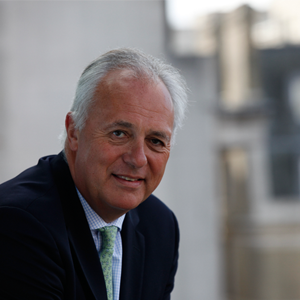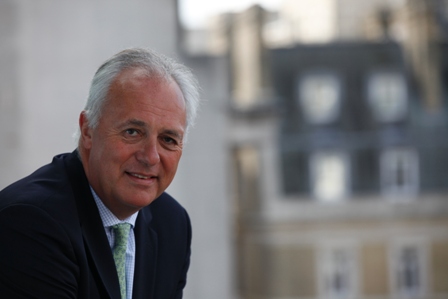


Lord Malloch-Brown will meet with influential leaders to discuss global inequality
Lord Mark Malloch-Brown, Chairman of SGO, will join Christine Lagarde, managing Director of the International Monetary Fund; Sri Mulyani Indrawati, managing Director and Chief Operating Officer of the World Bank; and Madeleine Albright, former U.S. Secretary of State to discuss global inequality.
As Chairman of SGO, and having worked as former deputy secretary general and chief of staff for the United Nation, Malloch-Brown has a very clear idea of both the challenges and opportunities that technology brings to this all-important topic. “When changes in technology and the impact of global markets risk skewing inequality even further, the challenge to policy makers is to contain this trend which so directly feeds poverty, forced migration, insecurity and conflict.”
Malloch-Brown’s participation will take place on January 31 at Wellesley College’s Madeleine Korbel Albright Institute for Global Affairs. This event will serve as preamble for a weekend-long symposium that will gather other scholars, policy makers and government officials to discuss global inequality in areas such as public health and hunger.
Read more about the event by clicking here.
![[GlobeScan] GlobeScan Dialogues: An interview with Lord Mark Malloch-Brown, Chairman, SGO Corporation](https://sgo.com/wp-content/uploads/2021/09/Globe_.png)
[GlobeScan] GlobeScan Dialogues: An interview with Lord Mark Malloch-Brown, Chairman, SGO Corporation
 London, 2 December 2015.- A few days ago, GlobeScan Chairman Doug Miller sat with SGO Chairman Lord Mark Malloch-Brown for an interview.
London, 2 December 2015.- A few days ago, GlobeScan Chairman Doug Miller sat with SGO Chairman Lord Mark Malloch-Brown for an interview.
The conversation covered an array of interesting topics, such as the pressures and challenges facing global business leaders nowadays and the importance of resiliency in developing sustainable business models.
Lord Mark Malloch-Brown also shared his thoughts on how markets have become more complex, and how the real impact of technology on business is just beginning to be felt. He recommends practicing deep listening and strategic planning to help business to “stay on their toes.”
"At SGO, one of our most interesting traits is that all of our software programmers live not in the ivory towers of Silicon Valley or Cambridge, or even Shoreditch, but in developing countries. We have programmers in Estonia, Belarus, Venezuela, and Panama; and they experience the problems of citizens in those countries. This gives them a sort of relevant inventiveness that the traditional Western company doesn’t get".
Expanding on this idea, Malloch-Brown said: “It’s one thing to be a Western company that tries to listen but what’s attractive is if you’re lucky enough to be a developing country company – because it’s in your DNA – those are your neighborhoods that you’re designing products for”.
We invite you to read the whole interview here.
![[Sky News] Mark Malloch-Brown discusses online voting in the United Kingdom](https://sgo.com/wp-content/uploads/2021/09/Sky_News.png)
[Sky News] Mark Malloch-Brown discusses online voting in the United Kingdom
London, 24 April 2015.- Smartmatic’s Chairman Lord Mark Malloch-Brown was interviewed on Sky News about the benefits of adopting voting technologies.
Lord Malloch-Brown explained to Martin Stanford on Sky News Digital View the different types of electronic voting (Remote and in-person voting), how these technologies work, and cited examples of countries such as Estonia, The Philippines and Brazil, where these technologies have been implemented with great success.
When asked if the United Kingdom could have this technology in five years, the Chairman of Smartmatic said that “it is absolutely up to politicians”, adding that implementing voting technology in the UK could potentially revive democracy, increase turnout, and get people more excited and participative.
Watch the complete interview here:
![[New Statesman] Read Mark Malloch-Brown’s thoughts on internet voting in the New Statesman](https://sgo.com/wp-content/uploads/2021/09/New-Statesman-logo.png)
[New Statesman] Read Mark Malloch-Brown’s thoughts on internet voting in the New Statesman
 SGO Chairman’s Mark Malloch Brown shared some ideas on the developing landscape of internet voting in The Staggers, The New Statesman’s rolling politics blog.
SGO Chairman’s Mark Malloch Brown shared some ideas on the developing landscape of internet voting in The Staggers, The New Statesman’s rolling politics blog.
In his piece, Mark highlights how during the last decade, voter turnout in the UK general elections has plummeted and how -by contrast- turnout in younger democracies is much higher. This phenomena is partly due "to a new shift we are seeing towards alternative voting methods."
Mark writes about the shifting tendencies towards technology-based voting methods that improve -among others- counting speed, results proclamation, accessibility and the inclusion of people that were usually left out for educational circumstances. He also points out how these new technologies could be used to motivate and improve the voting experience for UK citizens.
You can read the complete article in The New Statesman.
